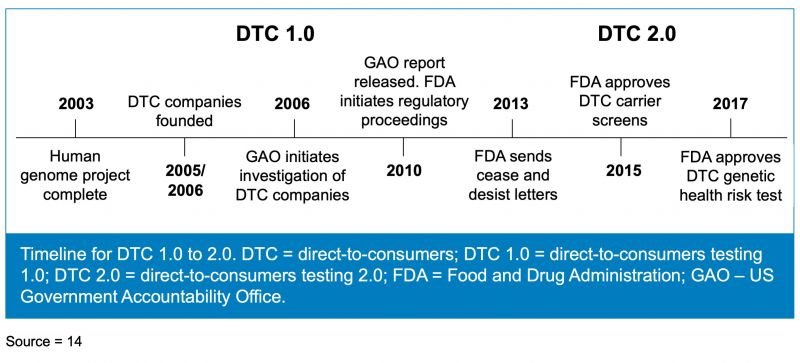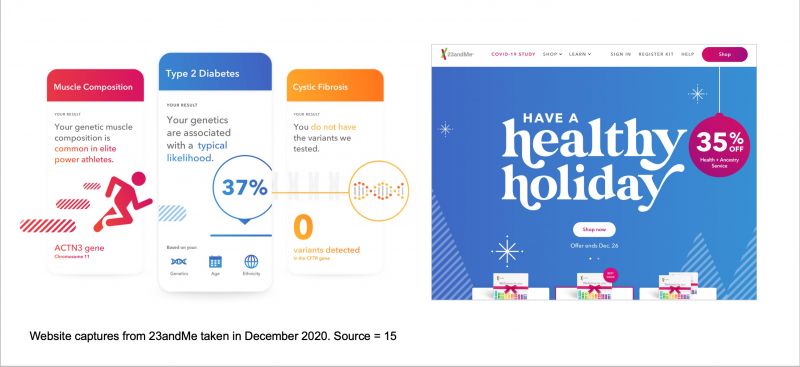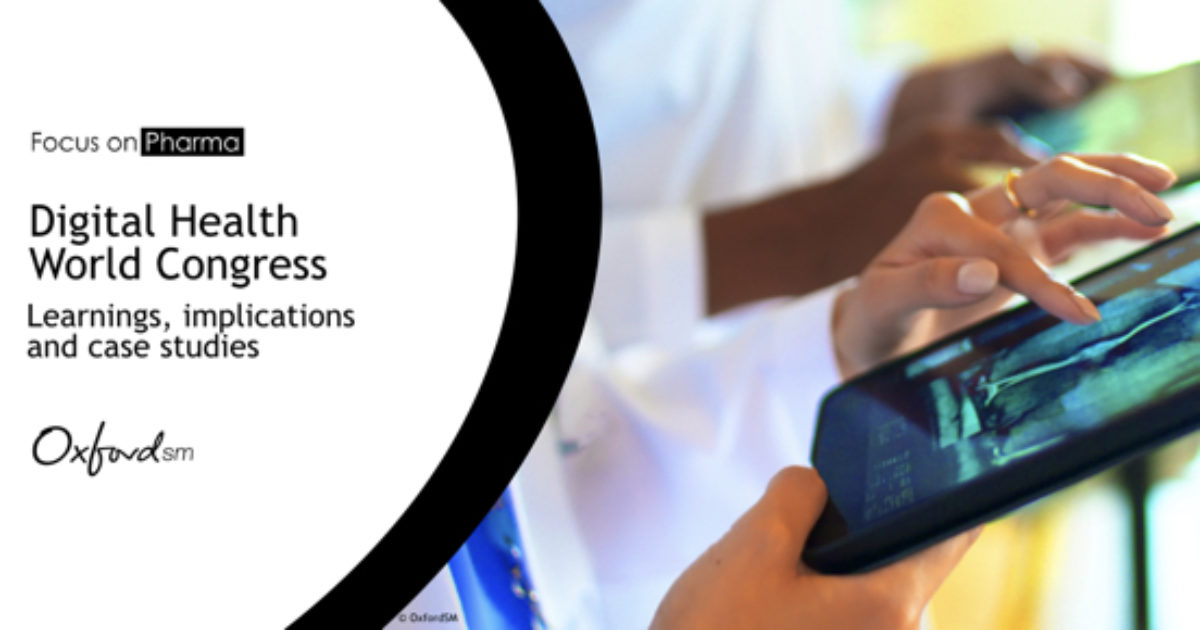Are diagnostics the solution to growing healthcare needs?
Diagnostics are growing in importance, with new generations of genetic tests emerging. Can these improve both clinical and economic outcomes?
Sign up for our 'Focus on Pharma' Newsletter
We'll send you a new, insightful article every month. We won't share your details with anyone else and we won't spam you.
2020 has definitely been the year of the diagnostic; how many people could tell you the difference between PCR tests and lateral flow assays this time last year? Now we’re all experts on how to detect the genetic signature of COVID-19 from nasal swabs ...
Today, the results of in vitro diagnostic tests influence 70% of medical decisions, and that number continues to grow (1), (2). Increasingly, however, diagnostic outputs need to do more than simply contribute to a diagnostic decision. Today, healthcare providers expect a clear action to be prompted on the basis of a result whether that be, perhaps, a trigger for a referral to a specialist, or the prescription of particular targeted treatment.
Roche’s vision for the future of diagnostics has also long been one of ‘connected laboratories’, where the company clearly sees its tests improving outcomes and reducing healthcare costs (4), (5).
We have seen an ever-increasing number of drug launches being driven by companion diagnostics.
This year Roche has led the charge in the rapid provision of multiple diagnostic methodologies to identify COVID-19 (6), and we have seen healthcare providers adapt their routine workflows just as quickly to accommodate the efficient and effective use of these diagnostics. What’s interesting for the future is whether we will now see some of the practical barriers that previously limited diagnostics fade away. As routines change on a more permanent basis, will we see the true value of connected laboratories (and the diagnostic services they offer) become more widely appreciated by multiple stakeholders?
Diagnostics that help trigger distinctive treatments can drive clinical and economic outcomes
Recent advances in data analytics have enabled tools to be developed that can overlay information about the context of a test with the actual test result, leading to far better recommendations for the optimal course of action.
In terms of the pharmaceutical industry, oncology has long led the way in the slow but continual drive towards precision medicine. Since the first launch of Roche’s Herceptin in 1998 we have seen an ever-increasing number of drug launches being driven by companion diagnostics (7), (8), (9).
Indeed, in their Launch Excellence VI white paper, IQVIA concluded that: “Where they are possible, companion diagnostics should be built into the development and launch of oncologics, defining the populations where the greatest benefit can be demonstrated” (10).
The diagnostics, of course, are there to determine eligibility for a particular treatment, but as well as driving better clinical outcomes, this also means that novel, expensive therapies are more readily reimbursed by payers as there is a promise of no unnecessary use and consequently no wastage. This should, in theory at least, drive to improvements in economic outcomes too.
The science and tools physicians and patients rely on help physicians distinguish the type of disease present in the patient, and with precision medecine, physicians can tailor a unique, patient-specific course of treatment. Today, however, there are still significant opportunities for additional automation that can both assist with the determination of optimized patient management and monitor its effectiveness
Lâle White, XIFIN CEO and Executive Chairman, January 2020 (2)
More recently, diagnostic tools have also proven their worth in monitoring both disease progression and response to treatment, further improving the direct impact they have on both clinical and economic outcomes.
There is more to be done though, and experts now talk of a future where all relevant data gathered is utilised not just to improve the management of disease, but also to identify risk and look to prevent it.
The hypothesis is that if we can collect data, analyse it, and seamlessly provide a prompt for an action, then we will make the very best of any disease management or treatment options available to us, and provide ever-more efficient healthcare systems, all of which are now operating under ever-increasing financial constraints.
Laboratories are consequently looking to improve their value proposition and add data analytic services and clinical decision support tools to their offering.
We’ve discussed before the interest in diagnostics from companies such as Amazon, Apple and Google (11) and, whilst reminding us of the value diagnostics can bring to both clinical and economic outcomes, it also highlights the reach of diagnostics beyond formal healthcare systems. Diagnostics is slowly, but surely, becoming a data-driven, consumer-driven market (12).
The Human genome project completed in 2003 (13) and, as early as 2005, we saw the first direct-to-consumer (DTC) genetic testing emerge (14). For the first time, these services enabled consumers to access information on their genetics without the involvement of a physician. Early services were popular with consumers, but were controversial in both medical and regulatory circles, and eventually halted in 2013. However, by 2015, the FDA approved DTC carrier screens and, since then, companies such as 23andMe have offered a mix of services for both ancestry and health purposes.

Do you really want to know what your DNA can tell you?
We certainly raised our eyebrows over the holiday period this year when we saw the money-off deals offered on services screening an individual’s DNA for established gene variants that are known to increase the risk of developing disease in the future.

We expect diagnostic developers to become more focused in linking diagnostics to treatment actions, and Pharma companies to increasingly partner their brands with companion diagnostics
Genetic tests are becoming far less expensive and far more accessible, but what do patients and healthcare providers do as a consequence today? The presence of a gene variant doesn’t mean you will necessarily develop the disease (16), (17). The latest research suggests there may be other factors that also have to be present; for example, perhaps a viral infection is required to trigger disease development. Many have speculated that this may partly account for the unexpected mortality rates from COVID-19 in some groups of patients, but the science is still at an early stage (18), (19).
Nevertheless, the accessibility of such genetic information provides a clear route to the potential for prevention of disease in the future – what’s currently missing is the lack of a link between the genetic test result and a clear trigger for action in an individual who, as yet, shows no evidence of disease.
In some areas of oncology, where patient organisations and advocacy groups are well established, we already see patients requesting specific tests of their oncologists, opening up the possibility of different treatment choices for existing disease, already diagnosed. We also increasingly hear of healthy individuals taking these type of genetic test results to their physicians to ask what they mean, and today, that’s a very hard question to answer.
We expect diagnostic developers to become more focused in linking diagnostics to treatment actions, and Pharma companies to increasingly partner their brands with companion diagnostics
The diagnostic landscape continues to change at a pace. Over the last five years we’ve seen manufacturers look to build wider portfolios that offer services driven by a greater number of methodologies. We’ve seen investment in data analytics in the drive to link test results to a specific action. We’ve seen smaller companies partner with larger companies, whether diagnostic or Pharma, to be able to commercialise more successfully – there’s a critical mass of placements required for commercial viability.
Healthcare providers have responded by investing in both laboratory equipment and staff training, as well as being more open to outsourcing those tests that are not driving immediate or urgent decisions. Genetic tests, relatively straight forward to perform and typically associated with very high sensitivity and specificity, are becoming commoditised with customers increasingly selecting their chosen provider based on price.
However, providing unambiguous results with a clear link to an action remains key, and we expect to see pharma companies developing brands reliant on a successful companion diagnostic to increasingly invest in the data analytic services that enable that easy interpretation of results (20), (21), (22), (23), (24).
If you’d like to talk about how this impacts on your business, from understanding the role of diagnosis in brand strategy, to the importance of diagnostics in physician behaviours, then please do get in touch. We’d love to talk.
Sources
- https://www.iqvia.com/library/white-papers/technology-disruption-in-the-ivd-arena
- https://www.xifin.com/resources/blog/202001/evolution-diagnostics-climbing-value-chain
- http://www.academia.dk/Blog/wp-content/uploads/KlinLab-Hist/LabHistory1.pdf, http://www.academia.dk/Blog/wp-content/uploads/KlinLab-Hist/LabHistory2.pdf , and http://www.academia.dk/Blog/wp-content/uploads/KlinLab-Hist/LabHistory3.pdf
- https://www.roche.com/
- https://www.roche.com/
- https://diagnostics.roche.com/us/en/landing-pages/roche-covid-19-updates.html
- https://academic.oup.com/jnci/article/91/15/1329/2543789
- https://www.gene.com/stories/her2/
- https://www.fda.gov/consumers/consumer-updates/personalized-medicine-and-companion-diagnostics-go-hand-hand
- https://www.iqvia.com/library/white-papers/launch-excellence-vi
- https://oxfordsm.com/events-articles/2020/the-rise-of-prescription-digital-therapeutics
- https://psychesystems.com/wp-content/uploads/2019/07/History_Molecular-Diagnostics_WPv1_2018-11.pdf
- https://www.genome.gov/human-genome-project
- https://www.mayoclinicproceedings.org/article/S0025-6196(17)30772-3/fulltext
- https://www.23andme.com/dna-health-ancestry
- https://www.technologynetworks.com/diagnostics/articles/exploring-the-ethics-of-genetic-testing-334271
- https://www.webmd.com/breast-cancer/news/20180327/genetic-testing-do-you-really-want-to-know
- https://humgenomics.biomedcentral.com/articles/10.1186/s40246-020-00280-6
- https://jasn.asnjournals.org/content/jnephrol/31/8/1688.full.pdf
- https://bmcfampract.biomedcentral.com/articles/10.1186/s12875-020-01125-w
- https://www.labcompare.com/10-Featured-Articles/353168-History-and-Future-of-Clinical-Diagnostics/
- https://www.iqvia.com/insights/the-iqvia-institute/reports/optimizing-oncology-care-through-biomarker-adoption
- https://www.iqvia.com/library/white-papers/covid-19-rapid-response-and-financial-impact-for-the-ivd-industry
- https://www.medtecheurope.org/access-to-medical-technology/value-of-diagnostic-information-vodi/
Share this
You May Also Like
These Related Stories

The use of AI in Neurology for accurate diagnosis

Digital Health Congress 2018 - learnings and implications

.png?width=657&height=57&name=OXFORD%20LOGO%20(1).png)
No Comments Yet
Let us know what you think